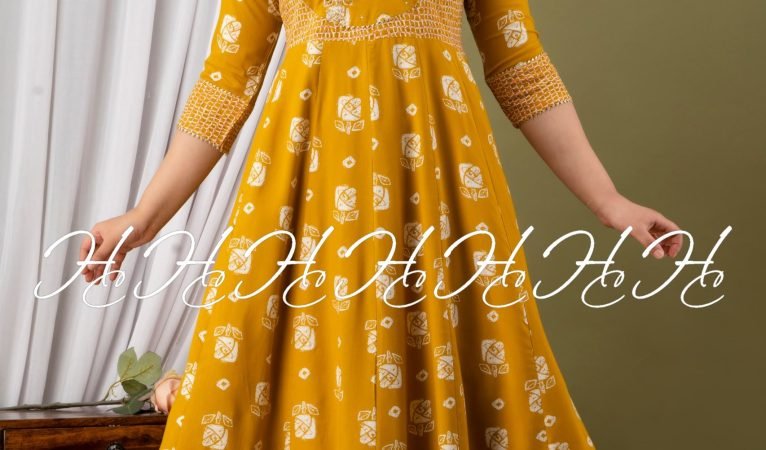Are there eco-friendly kurti manufacturers using sustainable fabrics?

The fashion industry is evolving at a fast pace, and one of the biggest changes is the shift toward eco-friendly and sustainable clothing. Today’s customers are more conscious about what they wear, not just in terms of style but also in terms of how garments impact the environment. This change has influenced kurti manufacturers in India to embrace sustainable practices. The question many buyers ask now is: Are there eco-friendly kurti manufacturers using sustainable fabrics? The answer is yes, and the trend is growing stronger.
The Rise of Eco-Friendly Fashion in India
India has long been known for its textile traditions, with handloom, cotton, silk, and block printing forming the heart of the industry. Over the last decade, buyers have demanded not only trendy but also sustainable designs. Consumers are looking for fabrics that minimize harm to the environment, reduce chemical use, and support ethical labor practices. As a result, many kurti manufacturers near me and across the country are investing in organic cotton, natural dyes, recycled fibers, and biodegradable materials.
This shift has made sustainability not just a buzzword but a business strategy. Manufacturers who adapt quickly are able to attract a new segment of eco-conscious customers while maintaining long-term profitability.
Why Sustainable Fabrics Matter in Kurti Manufacturing
Sustainable fabrics play a crucial role in reducing the negative impact of fast fashion. Traditional synthetic fabrics often rely on petroleum-based production, which is harmful to the environment and takes years to decompose. In contrast, eco-friendly fabrics such as organic cotton, bamboo, hemp, khadi, and Tencel are renewable and biodegradable.
When kurti manufacturers in India choose these fabrics, they not only reduce their carbon footprint but also provide healthier clothing options for customers. Wearing breathable fabrics that are free from harmful chemicals also ensures comfort, especially in a country like India where the climate often demands lightweight and skin-friendly textiles.
How Kurti Manufacturers are Adopting Eco-Friendly Practices
Many manufacturers are taking steps to integrate sustainability into their production processes. Some of the practices include:
- Organic Fabric Sourcing – Instead of relying on chemically treated cotton, manufacturers are investing in certified organic cotton and other naturally grown fibers.
- Natural Dyeing Techniques – Traditional dyeing often uses synthetic colors that pollute water sources. Eco-friendly kurti brands use vegetable-based or herbal dyes to ensure minimal impact on nature.
- Waste Reduction in Production – By recycling fabric scraps and reducing water usage, manufacturers are making the production cycle more sustainable.
- Ethical Labor Practices – Sustainability is not just about fabric; it is also about fair wages, safe working conditions, and empowering artisans who keep handloom traditions alive.
The Role of Indian Brands in Sustainable Kurti Manufacturing
Several brands are at the forefront of eco-friendly clothing in India. They combine modern design sensibilities with ethical production practices. For instance, Harsh Creation, a reputed name in the fashion sector, has been exploring sustainable fabrics and eco-conscious designs to meet the growing demand. By blending traditional craftsmanship with responsible sourcing, such brands are making sustainability fashionable.
Another example is boutique manufacturers who work on a smaller scale but focus entirely on eco-friendly collections. These businesses cater to buyers searching for “kurti manufacturers near me” who value both quality and environmental responsibility. By supporting such local businesses, buyers contribute to greener supply chains and reduce the environmental cost of international shipping.
Why Buyers Prefer Eco-Friendly Kurtis
The demand for eco-friendly kurtis is rising because customers want to align their lifestyle with their values. Here are some reasons why they prefer sustainable options:
- Healthier Clothing: Fabrics like organic cotton and bamboo are soft, breathable, and free from harsh chemicals.
- Support for Artisans: Many eco-conscious brands collaborate with local weavers and artisans, helping preserve traditional Indian crafts.
- Environmental Responsibility: Buying sustainable kurtis means reducing dependence on fast fashion and lowering textile waste.
- Unique Designs: Eco-friendly fashion often features handloom textures, natural prints, and earthy tones that stand out from mass-produced garments.
The Future of Sustainable Kurti Manufacturing in India
The future looks bright for eco-friendly kurti production. With rising awareness, more kurti manufacturers in India are switching to sustainable fabrics and ethical business models. Government initiatives that support handloom and organic cotton farmers further push the industry toward a greener future.
Brands like Harsh Creation are proving that fashion and sustainability can go hand in hand. By introducing eco-friendly collections, they are not only responding to customer demand but also setting an example for others in the industry.
How Buyers Can Support Sustainable Manufacturers
If you are a buyer looking to make responsible choices, here are a few ways to encourage eco-friendly kurti manufacturing:
- Research Manufacturers: Search for local or national brands that promote sustainability in their production. Use terms like “kurti manufacturers near me” to find nearby businesses that focus on eco-friendly fabrics.
- Check Fabric Labels: Always check whether the fabric is organic, recycled, or certified eco-friendly.
- Support Local Artisans: Buy from manufacturers who collaborate with rural artisans and handloom communities.
- Choose Quality Over Quantity: Invest in long-lasting, sustainable kurtis instead of buying multiple fast-fashion items.
Conclusion
Yes, there are eco-friendly kurti manufacturers using sustainable fabrics, and their presence in India is only growing stronger. The combination of customer awareness, ethical production, and innovative design has made sustainability an integral part of the kurti manufacturing industry. With established brands like Harsh Creation and several boutique manufacturers leading the way, buyers now have more choices than ever before. By supporting these manufacturers, customers not only enhance their wardrobe with stylish kurtis but also contribute to a greener, healthier future.

















